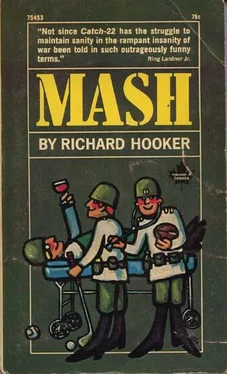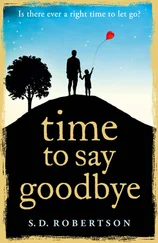“No you haven’t, Henry,” Trapper said. “Go ahead.”
“Yeah, go ahead,” Duke said.
“Look, O’Reilly,” Henry said, looking right at Radar. “What do you hear?”
“Nothing, sir.”
“Nothing!” Henry said. “What the hell do you mean, nothing?”
“I don’t hear anything, sir.”
“Well, what does that mean?”
“I believe it means, sir,” Radar said, “that the action has subsided in the north.”
“Good!” Duke said.
“Look, O’Reilly,” Henry said. “Are you telling the truth?”
“Why, sir! You know that I never …”
“Stop that, O’Reilly!”
“Yes, sir.”
“Radar,” Hawkeye said. “Tell us something else.”
“Yes, sir?”
“Do you hear the six o’clock choppers?”
“No, sir.”
“You sure?”
“Yes, sir.”
“Well, how the hell are you going to hear them, anyway, standing here?” Henry said, and he pointed toward the north. “You should be listening out there.”
“Yes, sir,” Radar said.
Radar started to walk slowly toward the north then, and they followed him. They formed a small procession, Radar in the lead, his ears at the right-angle red alert, his head turning on his long, thin neck in the familiar sweeping action. They walked across the bare ground the fifty yards to the barbed wire, beyond which lay the mine field, and they stopped.
“Well?” Henry said.
“Nothing, sir.”
“Keep trying.”
“Yes, sir.”
To the north the valley was blanketed in shadow now, the hills to the left dark, but the sunset colors still bathing the tops of the hills to the east. They stood behind O’Reilly, where they could watch him and the sky at the same time, and they maintained absolute silence. As they watched, the last of the colors left the eastern hills, the dusk mounted in the valley and only the sky held light.
“O’Reilly,” Henry said, “it’s six o’clock.” “Nothing, sir.” “It’s six-oh-five.” “Nothing, sir.”
“O’Reilly,” the colonel said, at about six-fifteen, “I can’t see my watch any more.”
“Nothing, sir.”
“Glory be!” the Duke said.
“Good work, O’Reilly,” the colonel said. “Dismissed.”
“Thank you, sir.”
“And by the way, Radar,” Hawkeye said, “stop by The Swamp tomorrow for a bottle of Scotch.”
“Thank you, sir,” Radar said. “That’s very kind of you, sir, but you were thinking of two.”
“OK,” said Hawkeye. “You’re right, and you’ve got two.”
“Thank you, sir.”
“We’re all crazy,” Henry said.
There was no jubilation. They were all too tired. In fact, they were exhausted, completely spent, and the Swampmen hit their sacks. When 6:00 a.m. came and went, and there were no choppers, they slept on, and at 8:00 a.m., when Radar O’Reilly, accompanied by an associate lab technician, entered The Swamp, he could have made any of the three the victim of his desperate need, not for two fifths of Scotch, but for a pint of A-negative blood, quantities of which were on order from Seoul but had not arrived.
“Captain Forrest?” he said, shaking the Duke. “Sir?”
“Not now, honey,” the Duke mumbled. “Gobacksleep.”
Gently, Radar straightened Duke’s right arm. Deftly, he injected Novocaine over a vein. Duke stirred but did not awaken, and while the assistant tightened the sleeve of Duke’s T-shirt to serve as a tourniquet, Radar skillfully inserted a No. 17 needle into the vein and joyfully extracted a pint.
“Where’d you get it?” Colonel Blake asked, after Radar had hurriedly cross-matched it and proudly presented it to his chief. “Twenty minutes ago you said there wasn’t any.”
“I found a donor, sir,” said Radar.
“Good boy,” said the colonel.
Two hours later the colonel himself was a visitor to The Swamp. By now Hawkeye was in the middle of Muscongus Bay between Wreck Island and Franklin Light. He and his father, Big Benjy Pierce, were hauling lobster traps.
“Finest kind,” Hawkeye was saying.
“C’mon, Pierce,” Henry was saying, shaking him, “C’mon. Wake up!”
“What’s wrong, Pop?”
“Pop, hell!” Henry said. “It’s me.”
“Who?” Hawkeye said.
“Listen, Pierce,” Henry said. “There’s a Korean kid in preop with a hot appendix. Who’s going to take it out?”
“You are,” Trapper John said, rolling over in his sack.
“Why me?” Henry said.
“Because,” Trapper mumbled, “although you are a leader of men, there are no men left.”
The business of doing major surgery on poor-risk patients can be trying and heartbreaking at any time, and when it is done regularly it can have an increasingly deleterious effect upon those who are doing it. It was therefore inevitable that The Deluge should have its after-effects, not only on the patients who survived but also on the surgeons who contributed to that survival. The first of the Swampmen to give outward evidence of what they had all been through was Hawkeye Pierce, and the first man to get caught in the fall-out was the anesthesiologist—Ugly John.
A good anesthesiologist is essential to any important surgical effort. Without one, the greatest surgeon in the world is helpless. With one, relatively untalented surgeons can look good. If the man at the head of the table understands the surgical problem and the surgeon’s needs, if he understands the physiology and pharmacology of carrying a patient through a hazardous procedure, if he can have the patient under deep and controlled anesthesia when it is needed and awake or nearly so at the end of the operation, he is an anesthesiologist and a boon to all mankind. If all he can do is keep the patient unconscious, he is just a gas-passer. There were more gas-passers than anesthesiologists in Korea, but in Captain Ugly John Black, limpid-eyed, dark-haired, and the handsomest man in the outfit, the 4077th had an anesthesiologist.
Ugly John probably worked harder than anyone else in the unit. Theoretically his responsibilities consisted only of supervising the anesthesia service. Actually, as the only one formally trained in anesthesiology, he was morally if not militarily bound to be available at all times. Too often this involved day after day of twenty-four hour duty, with only an occasional catnap. During busy periods like The Deluge the surgeons were constantly aware of his almost perpetual state of exhaustion and his greater than average effort. Nevertheless, when they had a tough one, they either wanted Ugly John to give the anesthesia or they wanted him to be around to check on it. Just his presence, or the knowledge that he was sacked out around the corner in the preop ward, was emotional balm to the man at the knife.
One of the most consistent customers of the 4077th MASH was the Commonwealth Division, consisting of British, Canadian, Australian, New Zealand and other assorted British Empire troops a few miles to the west. Captain Black had an intense, burning, complete, unremitting hatred for all the medical officers in the Commonwealth Division. His reason was very simple: they gave half a grain of morphine and a cup of tea to every wounded soldier. If the soldier was incapable of swallowing the tea, he still got the half grain of morphine. As a result of this treatment, it was frequently necessary to wait for the morphine to wear off before a patient’s condition could be assessed. If early surgery seemed reasonable or mandatory, Ugly John, in the process of getting the patient to sleep, often caught the tea in his lap. Frequently the patient had holes in his stomach or small bowel. In this situation, Ugly did not catch the tea in his lap. The surgeon would aspirate it from the abdominal cavity where it had leaked through the holes. The surgeons of the 4077th had the largest series of tea peritonitis cases in recorded medical history.
Читать дальше












